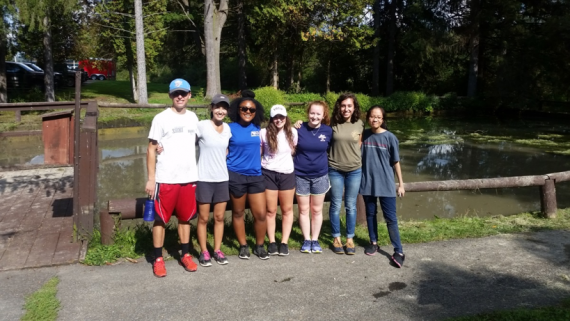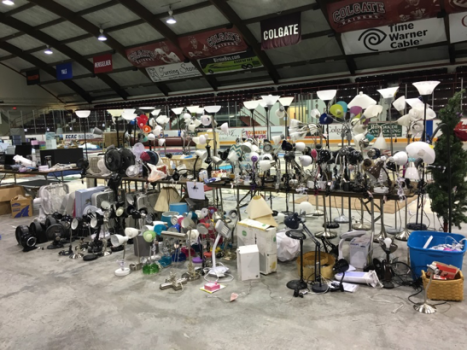Through luncheon programs, service days, seminars, and more, the Center for Outreach, Volunteerism, and Education continues to contribute to the community.
COVE Brown Bags
COVE Brown Bags are open to all students, staff, and faculty, and are a means by which COVE teams seek to increase knowledge and activism on issues related to their service work in the community. These luncheons take place weekly in the COVE lounge, and highlight a wide array of topic areas. This year, we hosted 23 events.
9/11 Day of Service
Last fall, the COVE joined the national network of more than one million Americans who serve their local communities in remembrance of the tragic events of September 11, 2001. The event encourages people campuswide to volunteer in the community as a means of paying tribute to the victims and heroes of 9/11.
Through our service, we remember the remarkable way that our nation rose up in unity and service following the tragedy of the attacks. Last September, more than 45 students, staff, and faculty participated in the afternoon of service contributing 140 hours of service to six local community organizations.

Martin Luther King Jr. Commemoration Events
We think Martin Luther King Jr. Day should be a “day on,” not a “day off.” Our goal is to bring people of various ages and backgrounds together to move our local community and nation closer to the “beloved community” that King envisioned.
This year, we organized a number of events to honor the legacy of Dr. King. On January 26, we joined the national commemoration of civil rights leader Martin Luther King Jr.’s legacy by hosting an MLK afternoon of service. Our students served at various community sites in Hamilton, Earlville, Sherburne, Morrisville, Madison, and Utica. This year, more than 48 volunteers worked at eight community organizations, combining for 150 total service hours.
Finding Money for Social Change Grant-Writing Class
In its 13th year, the 12-week, certificate-based grant-writing course brought together campus community visionaries, grant-writing experts, and local nonprofit leaders to deliver weekly lectures to 42 Colgate students and local community member participants.
At its core, the course offers insight into the architecture of a grant. Concurrent to the weekly lectures, students work in small groups to develop a project case study into a grant proposal for the nonprofit organization characterized by their case study. Utilizing this methodology, students are able to see the class theories and lessons put into practice.
High School Seminar Program
In its 58th year, the High School Seminar Program continues to use Colgate’s resources to benefit the region by introducing area high school students to college-level topics that are not available at their schools. The program encourages college attendance by providing students with the opportunity to experience a taste of life on a college campus. In the 2017–18 academic year, 15 schools sent a total of 278 students to participate over the 4 sessions of the High School Seminar Program. Of these 278 students, 117 attended two or more times throughout the year. Students are asked to evaluate the program at the end of each session and feedback has been very positive. Many students express how interesting the course is and how they wished they had more time. Students are asked about their plans after graduation and most have plans to continue their education at a four-year institution.
This year’s 24 courses included the following options:
- Remote Sensing: from Drones to Satellites
Mike Loranty, assistant professor of geography - Scrutinizing Stereotypes
Laur Rivera, manager of the perception and action language lab - Women’s Rights in US History
Monica Mercado, assistant professor of history - Genetically Modified Foods
Priscilla Van Wynsberghe, assistant professor of biology - Museums: What they are, stand for, can do, be, and how can one/teenager get involved?
Anja Chavez, director of university museums - Are we still winning the war on war? Peace and conflict in the 21st century
Jacob Mundy, associate professor of peace and conflict studies
Salvage Program
The Max A. Shacknai COVE staff organizes an effort to repurpose items that students donate in the residence halls at the end of the academic year as they move off campus. Volunteers spent more than 400 hours collecting and sorting the items in Starr Rink for pick-up by 34 nonprofit organizations located throughout central New York. Again this year, our colleagues in Institutional Advancement dedicated over 150 hours to the effort, expanding the community investment in this critical program.
The estimated worth of all salvaged items put into the hands of people who need them amounted to $60,000. The assistance provided by this program is profound – restocking food pantry shelves at a time of year when donations are low and children are about to lose their school lunch; providing supplies – such as cleaning supplies and toiletries that folks in our community cannot purchase with SNAP benefits; furnishing transitional housing for home-insecure individuals and providing educational materials to schools and college-bound students in our community.



